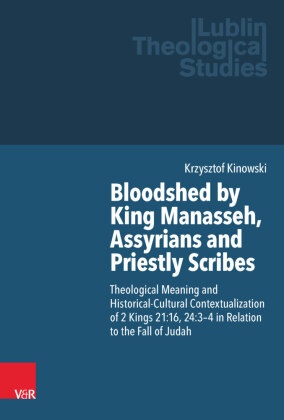
Bloodshed by King Manasseh, Assyrians and Priestly Scribes - Theological Meaning and Historical-Cultural Contextualization of 2 Kings 21:16, 24:3-4 in Relation to the Fall of Judah. Dissertationsschrift
| Verlag | Vandenhoeck & Ruprecht |
| Auflage | 2024 |
| Seiten | 374 |
| Format | 16,3 x 3,0 x 23,2 cm |
| Gewicht | 736 g |
| Artikeltyp | Englisches Buch |
| Reihe | Lublin Theological Studies Volume 008 |
| ISBN-10 | 3525500432 |
| EAN | 9783525500439 |
| Bestell-Nr | 52550043A |
Manasseh of Judah was an Assyrian vassal and a bloodthirsty ruler blamed for the fall of Judah in 2 Kings. Was he scapegoated by the temple priestly scribes of Persian Yehud?
King Manasseh of Judah - one of the most intriguing characters in the Bible
King Manasseh of Judah is one of the most intriguing characters in the Bible. 2 Kings presents him as the wickedest of monarchs. In 2Kgs 24:3-4, he is accused of having provoked God to destroy Judah on account of the innocent blood he had shed in Jerusalem (cf. 2Kgs 21:16). In his study Krzysztof Kinowski investigates this accusation, viewing it against the biblical and ancient Near East backgrounds, and casts a new light upon Manasseh's role in the fall of Jerusalem. The mention of bloodshed in this affair appears to be the outcome of a process of scapegoating of Manasseh, ongoing in 2 Kings and reflecting both the legal and the cultic paradigms governing the biblical historiography. The link between Manasseh's bloodshed and the destruction of Judah on account of the cultic land's blood-defilement points towards a group of priestly scribes involved in the production of the 2Kgs 21 and 24 narratives. This assumption lies behind the scholarly discussion about the Priestly-like stra ta and priestly touches in the Books of Kings.
